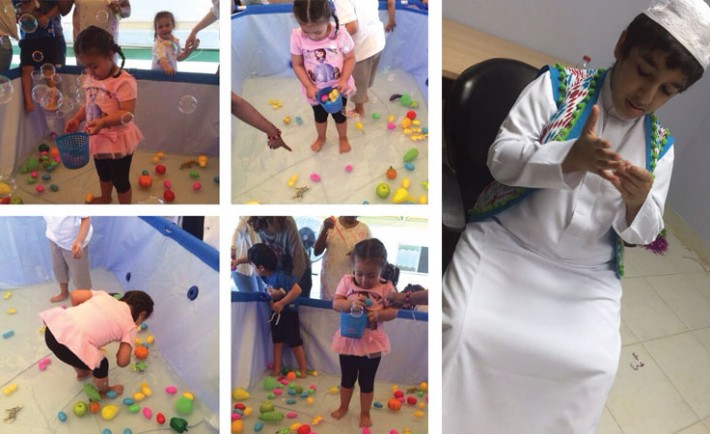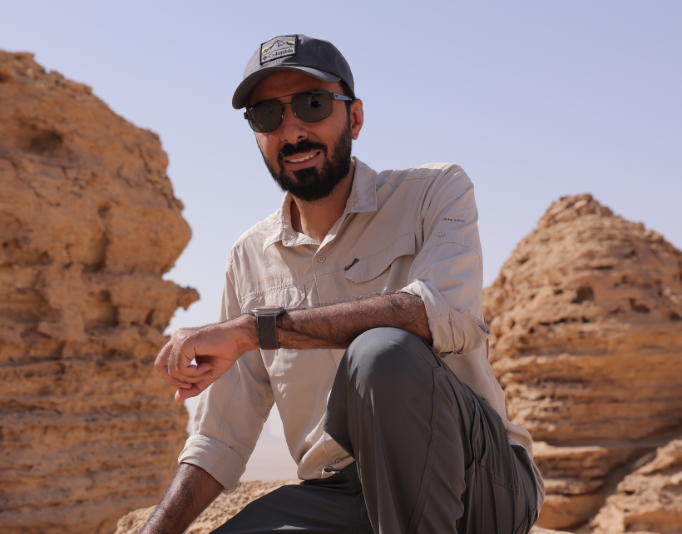By Johara Al Mogbel
A mother inspired by her own children, Reem founded Ain AlFaras, an educational center for children with special needs.
Can you tell us a little about yourself?
I majored in nutrition, and I’m a graduate of King Saudi University. I was going to continue my masters in nutrition, but then I got married and came back to Riyadh. I then worked for a year at Riyadh Bank as the branch manager.
 What were your experiences like before Ain Alfaras?
What were your experiences like before Ain Alfaras?
When I got pregnant with Mansour in 2002, I was in Switzerland, and they told me he was going to be born with a condition. They said he had XYY syndrome, that he would have a low IQ, and that he’d have delayed development. We stayed in Switzerland for six months after he was born to work with the doctors on his development, and when we came back to Riyadh I was so lost. I couldn’t find a decent place that offered the sort of services that a mother with a disabled child needs. I was going to a speech therapist in one hospital, and a physical therapist in another hospital, and another speech therapist in Prince Sultan Hospital, and I was getting a private therapist at home.
I put him in a day school, just for the academics. I would waste my whole day driving from one place to another, and I ended up neglecting my home, and my other children. So then we got the idea to open a center that would put all the services under one roof.
 Can you tell us a little about Ain Alfaras? What was the concept behind it?
Can you tell us a little about Ain Alfaras? What was the concept behind it?
When Seema, my sister, and I thought about opening the center, Seema had just volunteered in special needs centers in Canada. She decided to bring in the curriculum we used from there, the Teach Program as well as the Pecs Communication Program and apply it in a dedicated center here. We opened it in 2008.
How was the center founded? What disabilities do you specialize in?
The center opened with about 12 employees and three children. Now we have 100 employees and 63 children, and the school was accepting students with down syndrome or autism, as well as a number of other special needs. Recently, though, we had to close down our autism department so that we only focus on down syndrome and delayed mental development.
 Should a teacher who would like to work in special needs education have training with the degree or will she learn via experience? And which do think is more important?
Should a teacher who would like to work in special needs education have training with the degree or will she learn via experience? And which do think is more important?
Of course, for all the positions we take into consideration that the teacher either has experience or a suitable college degree, and we’ve found that sometimes we get a teacher who, regardless of her not having a degree, loves what she does so much that she excels more than the one with a college degree.
Oddly, we struggle with college graduates because most come to us with weak training, and the information they have about special needs is mostly from textbooks. Lately, though, KSU and PNU have been laying emphasis on their students training with actual special needs students, so that they can have practical experience as well as theoretical.
In either case, whether the student has more knowledge regarding plan making or academics, in presenting the programs, or whether she has more experience in handling the kids, we need both types.
 Science evolves rapidly and with it new methods of teaching usually springs up. How do you manage to keep up with the changes?
Science evolves rapidly and with it new methods of teaching usually springs up. How do you manage to keep up with the changes?
We have a number of contracts with specialists abroad, and we managed to entice a number of trainers from the States to train our teachers for two years and then supervise them afterwards for a month to provide an evaluation on the teachers and the children after application. We find the evaluation to be the most important part, and it’s very important for anyone working in special needs to never stop developing themselves and to keep up with current methods and researches to help the children transition into active members of society.
How do you balance your personal life with the nature of your job as a principal and co-owner of the school?
Of course, as a principal, I have to separate between being Mansour and Haya’s mother and being their headmaster during school hours. When I go to school I act and feel as the administrator to run it, but when I go home I’m their mother again. I think it’s impertinent for special needs workers to separate between their jobs and their personal lives so that a decent balance between the two is achieved.
 What’s the most important change you’d like to see in Saudi society in regards to people with disabilities?
What’s the most important change you’d like to see in Saudi society in regards to people with disabilities?
The attitude. We’ve placed the first stepping-stone to change the attitude of society towards children with disabilities; the rest must be set by the members themselves. Raising awareness has become more popular recently, and I have hope in the innate goodness of the people in this country.










